Social Media and Diplomacy

By: Ziyan Qutub / Arab America Contributing Writer
Introduction
In the ever-evolving landscape of global diplomacy, the role of media has become increasingly pronounced, shaping narratives, influencing perceptions, and impacting policy decisions. This article delves into the intricate dynamics of media influence on global diplomacy, with a specific focus on the pervasive negative bias in Western media coverage of the Middle East. The ramifications of this bias extend beyond mere reporting, significantly influencing international relations, policy formulations, and diplomatic interactions. By examining historical examples, and scholarly analyses, and proposing a framework for rectifying distortions, this article aims to provide a comprehensive exploration of the influence of media on global diplomacy.
Media Bias and Reinforcement of Stereotypes
At the heart of the issue lies the dominance of Western media in shaping the narrative about the Middle East. This dominance perpetuates stereotypes, reinforcing biases that distort the nuanced realities of the region (Jönsson & Hall, 2003). The impact of media bias goes beyond words; historical examples, such as the careful selection of envoys and gift exchanges, underscore the significance of nonverbal communication in diplomatic interactions (Leguey-Feilleux, 2009). Tehranian’s (1997) exploration of mass media’s impact on public diplomacy further highlights how negative biases can seep into policy decisions, creating a ripple effect in global affairs.
Consequences for Diplomacy
Negative biases wield a substantial influence on perceptions of the Middle East, acting as formidable barriers to effective diplomatic efforts (Gilboa, 2002). The skewed portrayal not only impedes understanding but also erodes the foundation of cooperation between Western nations and Middle Eastern stakeholders (James, 2016). Grygiel’s (2007) geopolitical analysis emphasizes the necessity of aligning diplomatic strategies with underlying geopolitical realities, urging a departure from distorted narratives that hinder informed decision-making.
Media as a Shaper of Policy
Beyond shaping public opinion, Western media bias extends its influence on policy decisions, potentially leading to interventions that may not be in the best interest of the Middle East (Tehranian, 1997). This raises fundamental questions about the responsibility of Western nations to acknowledge their role as architects of the narrative. A critical examination of the interplay between media and policy decisions is imperative to understand the broader implications for global diplomacy.
Addressing the Issue
To rectify this issue, a collective effort is required from Western media outlets, policymakers, and diplomats to actively counteract negative biases (Leguey-Feilleux, 2009). The solution lies in providing more comprehensive and nuanced coverage of the Middle East, shedding light on positive developments, and showcasing the cultural richness of the region (James, 2016). Grygiel’s (2007) emphasis on aligning diplomatic strategies with underlying geopolitical realities becomes a guiding principle in dismantling biased narratives.
Recognizing Responsibility
Western stakeholders must recognize their profound responsibility in shaping perceptions and narratives (Grygiel, 2007). A commitment to promoting a more accurate, balanced, and fair representation of the Middle East is not just a moral imperative but a strategic necessity for fostering understanding, cooperation, and lasting solutions (Jönsson & Hall, 2003). By acknowledging the influence they wield, Western nations can actively contribute to a more harmonious and diplomatic global landscape.
Conclusion
In conclusion, the inherent negative bias in Western media poses a formidable challenge to effective global diplomacy, particularly in the intricate landscape of the Middle East. A comprehensive effort from Western stakeholders is imperative to provide a more accurate, balanced, and fair representation of the region. This involves addressing media biases, recognizing responsibility, and fostering a deeper understanding of the complexities involved. Only through such concerted efforts can we hope to navigate the intricate web of media influence on global diplomacy and build a more cooperative and informed international community.
Check out Arab America’s blog here!








